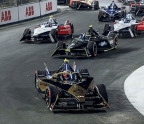
Hydrogen is an abundant element when it comes to fuelling propulsion. Its potential to replace liquid fuels in internal combustion engines is an exciting prospect for many car makers, and the drivers for its implementation in that regime are vast. However, there is another significant opportunity for hydrogen in vehicle propulsion in the form of hydrogen fuel cell electric power.
A team of TU Delft technical department students and several engineers external to the university have designed, built, and raced a hydrogen fuel cell electric-powered prototype to demonstrate the possibilities for hydrogen in motorsports, mobility and more.
The team, called Forze Hydrogen Racing, was set up to accelerate the marketing, activation and visibility of hydrogen and the technology inside fuel cell cars. The result is a collaboration of academic programmes and industrial partner-engineered design, providing a laboratory environment to develop hydrogen fuel cell technology under rigorous racing conditions.
The team was set up to accelerate the marketing, activation and visibility of hydrogen and the technology inside fuel cell cars

Forze Hydrogen Racing was founded in 2007 and started by putting small fuel cells on a go-kart. The latest car, the Forze IX, is a full-scale prototype racer that currently competes in an Open GT racing class in The Netherlands. It is considered a breakthrough in hydrogen fuel cell electric car performance.
Fuel cell operation
The Forze IX is an electric-powered prototype racecar with a supercapacitor accumulator, and two independent EKPO fuel cell stacks that produce its electricity. The sensitive operation of the hydrogen fuel cell makes designing






